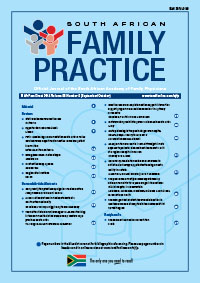An evaluation of stress in medical students at a South African university
Keywords:
medical students, South Africa, stress
Abstract
Background: Medical educational programmes strive to produce competent and skilled graduates. However, studies have shown that undergraduate medical students experience varying degrees of stress which impacts on their health, academic performance and social functioning. This study explored the prevalence and causes of stress, its impact on students and their coping strategies in a racially diverse cohort of final-year medical students exposed to a problem-based learning curriculum in South Africa. Method: This descriptive cross-sectional study was undertaken by final-year medical students in 2008 at a South African medical faculty with a racially diverse student population. Semi-structured interviews were conducted. Data were thematically analysed. Results: Ninety-four students, representing 47% of the final-year medical student cohort, participated in the study. Seventy-eight per cent of the participants (n = 73) experienced stress during the programme, and the majority (n = 49) were females. Ethnic and gender differences were observed for the variables studied. Academic and personal problems were the main sources of stress. Coping strategies included individual lifestyle adaptations, family support, religious structures and study groups. Conclusion: Maladaptive stress impacts negatively at multiple levels on undergraduate medical students. Mentorship and educational support programmes should be integrated into the undergraduate medical curriculum and made available to all preclinical and clinical students. Students need to be taught and guided to identify and monitor their own well-being and to select positive strategies to overcome stress. These measures should assist students to manage their workload and time effectively.
Published
2015-01-30
Section
Original Research
By submitting manuscripts to SAFP, authors of original articles are assigning copyright to the South African Academy of Family Physicians. Copyright of review articles are assigned to the Publisher, Medpharm Publications (Pty) Ltd, unless otherwise specified. Authors may use their own work after publication without written permission, provided they acknowledge the original source. Individuals and academic institutions may freely copy and distribute articles published in SAFP for educational and research purposes without obtaining permission.

